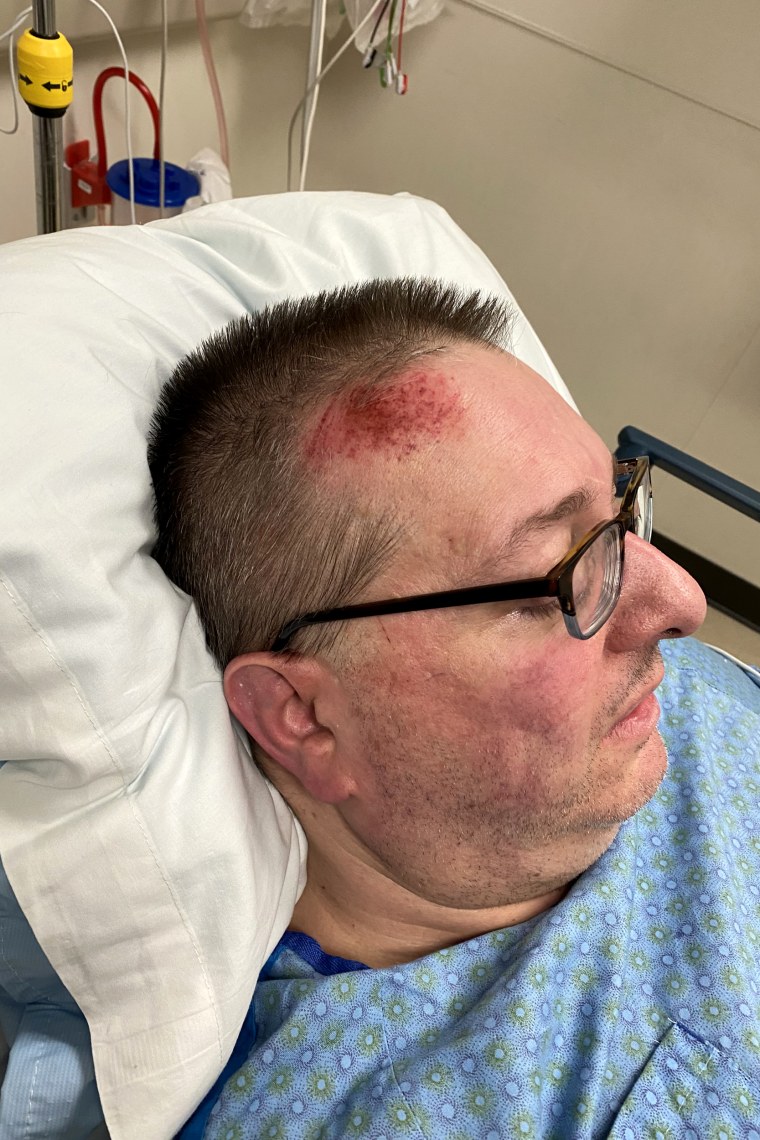When John Karadell was admitted to the hospital after a stroke, his doctors quickly pushed for him to begin an intensive form of rehabilitation — the sooner the better.
“Almost immediately they started telling me that the No. 1 most important thing now is to as quickly as possible get me into what they call acute rehab,” said Karadell, 58, of Howell, Michigan. “They used words like, ‘This is crucial. This is essential to your recovery.’”
But after 11 days in a hospital bed with no word on when he’d be transferred to the facility, Karadell said he learned his health insurer, Aetna, had denied coverage for what’s known as acute post-stroke rehabilitation.
What followed was a weekslong back-and-forth between Aetna and the hospital, University Hospital in Ann Arbor — including phone calls, bureaucratic delays and miscommunication, according to a Michigan Medicine spokesperson, an Aetna spokesperson and hospital case notes reviewed by NBC News.
More than a month after Karadell’s stroke, he said he essentially gave up and left the hospital to go to a less-intensive rehab program, a downgrade from what his care team consistently recommended throughout his hospital stay.
“I’m left with what I believe is permanent damage,” Karadell said. “And I’m left to wonder: Could it have been different if they would have approved what they should have done?”

In a statement, an Aetna spokesperson said the circumstances surrounding Karadell’s denied claim are “complex” and the insurer’s ability to process claims and appeals is “dependent on the timeliness and comprehensiveness of the information we receive from the provider.”
“We understand the frustration whenever there is a health care process that is complicated or does not meet a member’s expectations,” the spokesperson said. “Even though the vast majority of experiences are managed smoothly, our company strives to partner with healthcare providers to make sure each member receives what’s expected every time.”
The spokesperson added, “as we are not in the hospital with this patient, we expect our providers to partner with us and play an active role in conveying important clinical information to us that we would not otherwise have.”
Karadell’s experience, however, is far from unique: A nationwide survey of more than 1,300 insured adults found over a third — 36% — had had at least one claim denial, said Miranda Yaver, an assistant professor in the department of health policy and management at the University of Pittsburgh who conducted the survey. Almost 60% of those patients, she said, went on to have the same claim denied multiple times. Half of the people who were denied ended up postponing their care.
If you are dealing with bills that seem to be out of line or a denial of coverage, care or repairs, whether for health, home or auto, please email us at Costofdenial@nbcuni.com.
What appears to have happened to Karadell can be best described as “rationing care by inconvenience,” said Yaver, who wasn’t involved with Karadell’s case.
It’s a tactic, she believes, that health insurers use to limit spending. By making the process of getting coverage difficult — either through paperwork, repeated denials or a complex appeal process — they count on doctors and patients giving up.
“It’s not that you’re never going to get the approval, but it ends up being this endurance contest and administrative burden,” she said. “And it’s really overwhelming, especially because when we’re navigating these things, it’s not on our best day, it’s on our worst.”
‘Discharge has been delayed’
Some form of rehab is recommended for all patients after a stroke, according to the American Stroke Association.
The program recommended for Karadell — known as acute post-stroke rehabilitation — is typically for patients who still have significant difficulties, such as trouble walking, feeding themselves or bathing but are medically stable enough to tolerate therapy, said Dr. Nneka Ifejika, chief scientific officer at Ochsner Health System in New Orleans and an ASA national volunteer expert. Ifejika was not involved in Karadell’s care.
In a hospital note dated June 8, 2024, two days after he was admitted, Karadell was described as still having significant difficulty getting dressed, bathing, brushing his teeth and using the bathroom on his own. He also required some help eating meals. He had dizziness and intense pain in his neck. His wife, Emily Steiner, also said he had vision and speech problems. The note said he was doing well with the therapy he was getting at the hospital but recommended a more intensive program.
“Progressing well in therapy, will greatly benefit from multidisciplinary rehab at IPR [inpatient post-acute rehabilitation] to facilitate maximal independence in ADLs [activities of daily living] and functional mobility prior to return home,” the note said.
Ifejika said that it’s critically important for stroke patients to start rehab as early as possible because delays can lead to worse health outcomes, including long-term disability.
The longer a stroke patient is bedridden, the more their physical ability and mobility decline, she said. Extensive stays in the hospital can also lead to increased risk of falls or getting an infection, she said. (In Karadell’s case, his wife said, it also took a mental toll, as he had trouble sleeping due to noise and patients sharing the room.)
Ifejika said she typically starts patients in rehab within two to three days of a stroke. “They go directly from the hospital to the rehab facility, whether it be a freestanding rehab facility or a hospital-based rehab facility,” she said.

The hospital spokesperson said the hospital’s admissions coordination submitted a prior authorization request for Karadell’s intensive rehab on June 12.
On June 17, Aetna denied the coverage, saying that clinical documentation hadn’t been submitted, the hospital spokesperson said. The spokesperson added that the insurer did not offer an opportunity for a hospital physician to speak to a doctor from the insurance company about the request, a process known as a peer-to-peer review. An Aetna spokesperson said it would have provided a peer-to-peer review if the hospital had requested it.
The hospital submitted an expedited appeal that day, the hospital spokesperson and Steiner said. An Aetna spokesperson said the hospital’s appeal was not submitted as “expedited.”
That same day, a hospital note said that Karadell was “significantly below baseline of function,” adding: “Recommend IPR to progress independence in ADLs.” In a second note also dated June 17, a doctor wrote: “Today, discussed with patient will continue to work on IPR admission. He states he is frustrated with how long it has taken but hoping to begin therapies soon.”
One week later, however, Karadell was still in the hospital. “Discharge has been delayed by rejected insurance authorization despite our strong medical recommendation for discharge to IPR,” a doctor wrote in a June 24 note.
Two days later, on June 26, a hospital note said: “He and wife continue to voice their frustration regarding the insurance-related delays.”
In the days that followed, the hospital said Aetna denied the approval for a second time.
Subacute care
On June 30, nearly 30 days after Karadell’s stroke, Aetna said it approved the intensive rehab, but the hospital spokesperson said they didn’t receive the approval until July 5, a Friday. That Monday, the hospital said it contacted Aetna to confirm the approval but learned it had expired the day before. At that point, Karadell gave up and opted to get less intensive rehab closer to home — an option that his care team had been considering as a backup and had already been authorized. (Aetna said it had canceled the intensive rehab approval because of the hospital’s request to send Karadell to a less-intensive program, as the two requests were mutually exclusive.)
Ifejika said that so-called subacute care, which is often provided at an outside facility, such as a nursing home or assisted living facility, is easier to get insurance approval for because it’s less expensive.
However, she added, studies show it comes with a higher risk of hospital readmission compared to acute rehab.
“Sending them to a skilled nursing facility is actually doing them a disservice,” she said.
Steiner said the assisted living facility Karadell went to only had a part-time physical therapist, and he was doing less rehab than he had been doing at the hospital.

At one point, he said, he needed help getting up to use the bathroom but couldn’t get assistance and ended up falling.
“That was quite frankly awful,” Steiner said. “None of this I knew at the time, really how significant of a difference it was going to be.”
Karadell left the facility after about two weeks. Though he could have stayed longer, “I wanted to go home so desperately,” he said.
Karadell was also left with a bill for more than $150,000 marked “pending” in his hospital file, the result of his extended stay. When NBC News recently asked the hospital about the bill, a spokesperson said it had been going back and forth with Aetna over how much would be covered. Aetna paid around $37,000 and the hospital wrote off the rest.
Prior authorization
Health insurers have pledged to take steps to streamline the often-criticized prior authorization process for approving claims.
In June, Health and Human Services Secretary Robert F. Kennedy Jr. said the country’s largest health insurers had promised to take steps to reform prior authorization, including quicker approvals and reducing the number of medical services subject to the rule.
Health insurers have made similar commitments in the past, including in 2018 and again in 2023. Many failed to implement such reforms.
Dr. Adam Gaffney, a critical care physician and assistant professor at Harvard Medical School, said more fundamental reform, likely from Congress, will be needed to address the health care barriers imposed by insurance companies.
Yaver, of the University of Pittsburgh, said many doctors — and patients — agree that reform is needed.
In more than 100 interviews with doctors, Yaver said many had stated that the prior authorization process had gotten more difficult over the years, not easier.
“On the physician side, this requires a lot of time and staffing,” she said. “Some of them attribute this to contributing to burnout.”
On the patient side it “destabilizes their health and economic lives,” she added.
Karadell — who says he still has numbness in his legs, back, face and feet and struggles with simple tasks, like climbing stairs and reaching for the remote — said the experience “changed my life forever.”
“I always have to watch my step,” he said. “When I leave the house and I go to the store or to go get something to eat, I have to watch the ground because I’m scared of falling.”
